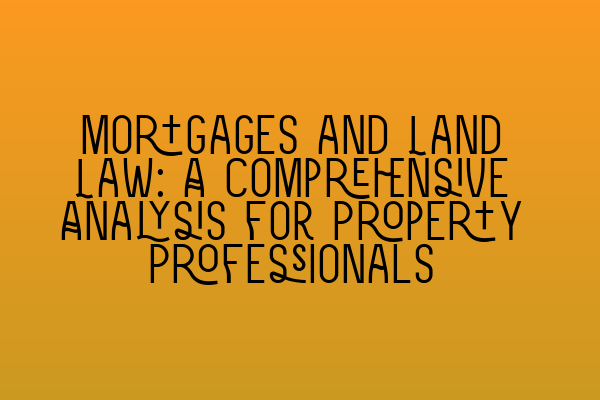Mortgages and Land Law: A Comprehensive Analysis for Property Professionals
Introduction:
Welcome to the SQE Property Law & Land Law blog post where we will be delving into the intricate world of mortgages and land law. As a property professional, it is vital to have a comprehensive understanding of these areas to ensure that you can provide effective legal advice and guidance to your clients. In this post, we will explore the key concepts, legal principles, and practical considerations surrounding mortgages and land law.
1. Understanding Mortgages:
A mortgage is a legal agreement between a borrower, often referred to as the mortgagor, and a lender, known as the mortgagee. It is a mechanism used to secure a loan against the borrower’s property. The lender provides financing in exchange for the borrower granting them an interest in the property. This interest is known as a mortgage or charge.
It is important to note that a mortgage creates an encumbrance on the property, meaning that the borrower cannot freely dispose of the property without satisfying the terms of the mortgage agreement. This encumbrance ensures that the lender has a right to the property in the event of default, allowing them to enforce their rights and recover the outstanding debt.
2. Types of Mortgages:
There are various types of mortgages, and it is essential to understand their nuances to provide tailored advice to your clients. Some common types of mortgages include:
– Repayment Mortgages: With this type of mortgage, the borrower makes regular payments that cover both the principal and interest. Over time, the borrower reduces the outstanding debt until it is fully repaid.
– Interest-Only Mortgages: Unlike repayment mortgages, interest-only mortgages require the borrower to make regular interest payments. The principal amount remains unchanged throughout the term, and the borrower must repay it at the end of the mortgage period.
– Fixed-Rate Mortgages: Fixed-rate mortgages offer stability as the interest rate remains constant for a specified period. This allows borrowers to plan their finances without the risk of sudden interest rate fluctuations.
– Tracker Mortgages: Tracker mortgages have interest rates that track a specified index, such as the Bank of England base rate. As the index fluctuates, the interest rate on the mortgage adjusts accordingly.
3. Legal Considerations:
When dealing with mortgages and land law, it is vital to consider the legal aspects that govern these transactions. Here are some key legal considerations:
– Creating a Mortgage: To create a valid mortgage, certain legal formalities must be followed. These may include executing a mortgage deed, registering the mortgage with the Land Registry, and complying with statutory regulations.
– Rights and Obligations: It is crucial to understand the rights and obligations of both the mortgagor and mortgagee. These include the mortgagor’s duty to make repayments, the mortgagee’s right to possession in the event of default, and the mortgagor’s right to redeem the mortgage.
– Foreclosure and Repossession: In cases of default, the mortgagee has the right to enforce their security by initiating foreclosure proceedings. This may ultimately lead to the repossession of the property. Understanding the legal process and the borrower’s rights is essential in providing guidance and support to clients in distress.
4. Practical Considerations:
In addition to legal considerations, there are practical aspects that property professionals should bear in mind when dealing with mortgages and land law:
– Due Diligence: Conducting thorough due diligence is crucial when advising clients on mortgage transactions. It involves investigating the property’s title, conducting searches to identify potential issues, and assessing the borrower’s financial capacity to meet mortgage obligations.
– Negotiating Terms: Property professionals often play a significant role in negotiating mortgage terms on behalf of their clients. This includes interest rates, repayment periods, early repayment charges, and other relevant provisions. Skilled negotiation can help secure favorable terms for borrowers.
– Compliance and Regulatory Framework: The mortgage market is heavily regulated to protect consumers and maintain market stability. Property professionals must stay abreast of the regulatory framework, such as the Financial Conduct Authority’s Mortgage Conduct of Business (MCOB) rules, to ensure compliance and provide trustworthy advice.
Conclusion:
As a property professional, understanding the complex world of mortgages and land law is crucial to providing high-quality legal advice and support to clients. This comprehensive analysis has covered key concepts, legal considerations, and practical aspects to equip you with the knowledge necessary to navigate this field. By continually updating your knowledge and staying informed about regulatory changes, you can confidently guide your clients through mortgage transactions and land law matters.
For more resources to enhance your legal expertise, explore the following related articles:
– SQE 1 Practice Exam Questions
– SQE 1 Practice Mocks FLK1 FLK2
– SQE 2 Preparation Courses
– SQE 1 Preparation Courses
– SRA SQE Exam Dates
We hope you have found this blog post informative and valuable for your professional development. Should you have any further questions or require legal assistance, do not hesitate to contact SQE Property Law & Land Law, your trusted experts in property law matters.
